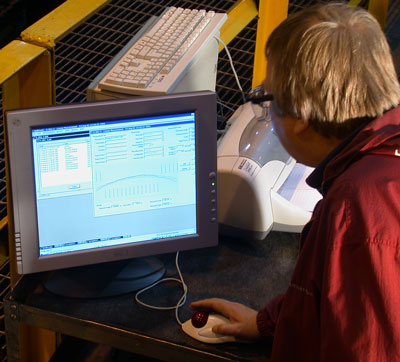RollTrack®
Picture: The RollTrack® system is being tested.

Most elaborate RollTrack® software features include:
– Restore/backup roll reports from/to hard drive to/from diskette/network.
– Store and edit roll information by roll or job numbers.
– A page for additional roll data for each roll.
– Save, edit, delete roll measurement reports.
– Warning if the graph screen is escaped without saving a report.
– Change scale, tolerances, and # of stations before or after saving a report.
– Taper correction; A report can be redrawn without a taper error.
– ‘Examine graph’ for readings and locations between the stations.
– Non-centered (start from 0, or zero in the middle) or centered graphs.
– Low, standard or high resolution.
– Easy switching between inches/mm.
– Change wheel diameter or encoder line count in options if resp. hardware is replaced.
– Data fields for customizing the report form quickly any time.
– In addition to continuous graphs, the gauge readings can be recorded manually at each station.
– The PC system may be used to plot existing reports by entering the station values via the keyboard.
– Measurement results can be exported to the RollTrack® Grind or other CNC controls for automatic grind correction.
– Measurements reports can be saved in PDF format for emailing, etc.
The RollTrack® system uses an off-the-self Windows 7/8/10 PC system. The benefits of the PC based recording systems are that the measurement reports are recorded and plotted automatically reducing possibilities for human errors. The reports include roll and measurement data on a single form, so there is no need for hand written report generation.The graphs are also great diagnostics tool when trouble shooting roll grinder or paper machine problems.
FMT RollTrack® Roll Caliper systems:
Profile/Crown
Caliper Tracking (Roll Grinder Ways)
T.I.R. (Total Indicator Reading)
– always included odd number lobes
Two Plane Concentricity
Roundness (one- and two-probe)
– including oval shape
– including odd number lobes
Roll Motion
Compensation curve for roll grinder controls
– axial
– circular